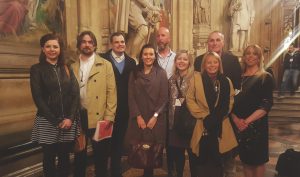I just came back from the UK Parliament where 10 of the frontline staff we worked with from the Systems Changers programme took part in presenting the programme, their learnings and hearing from people with lived experience. Here’s an overview of what happened.
Systems Changers
Led by The Point People and made possible by the forward thinking Lankelly Chase who believe in systems thinking, it was an honour to step in and give an overview of the programme I supported last year.
Systems Changers is a 12 week programme that asks the question:
Can, and how can, the insights of frontline workers influence systems change?
The important distinction to make is that we are not a learning or an innovation programme looking for quick fixes. It’s about holding the space for insights and looking at the system as a whole.
Over the course of our work, the cohort of frontline staff who work with people who face severe and multiple disadvantage:
- developed insights and plans for systems change;
- learned about themselves as individuals, their organisations and how dark matter (power/relationships/networks) all affect bureaucracy and more widely the system – ultimately having an effect on the people they are trying to support.
We wanted to question what do we know about the system, our roles and others within it? How can we understand our place and role within it to affect change?
It’s easy to always say, ‘I can’t do anything about it’ but we were fundamentally seeking to question and discover who can and what needs to change.
The newspaper
There are a full stack of insights and learnings from the programme in this newspaper we co-designed during the final residential but I’ll pick out one overarching point:
New areas in which frontline workers have a distinct offer for systems change
“I’m motivated like they are [government people] – but I’m doing it from a different angle.”
Systems change can’t be done with a project-based approach – what’s required is to build R&D capacity and mobilise movements of civil servants, practitioners and ordinary people. Within that, FW (frontline workers) have an important role because they bring a different type of power. If FW link up across organisations at the frontline, they bring a lateral networked power.
The frontline also has access to the stories behind the data and can generate a very different way of tying the micro to the macro and bringing data alive. They are also points within the system that can act as feedback loops at a more granular level. As Myron Rogers said “people who do the work do the change.” And being at the frontline means that these workers have an intelligence and insight into the day to day functioning of the system that is invaluable in shaping how the system changes.
There is something very important about hearing from those with lived experience and those working at the very frontline in the established setting of Westminster. To bring this discussion to the arena and hear from individuals like Chris Kelly (Assistant Head of Health and Justice, NHS England) and Zeb from Liverpool who’s got lived experience and was part of the Hard Edges work by the Innovation Unit, gives a powerful message from Lankelly Chase that all these voices need to come together and be heard.
Courage
I’ll finish with a quote from Chris Woodward, a service user involvement worker from Petrus in Rochdale who was part of the programme:
“We can choose comfort or we can choose courage. I choose courage”
What came through yesterday, and from the programme, is that it’s all of our role to ensure we have a balanced, respectful and supportive society. We need to choose courage whether that’s telling our own stories, challenging the status quo or admitting we need to do better.
I can wholeheartedly say that, whilst the programme was emergent and at times difficult to ensure we’re headed together in the right direction, it’s been an incredibly rewarding experience: working alongside such a fantastic and dedicated group of people across the UK and stimulating the conversation around the need for systems change not just service re-design.
